
Rosie Grant and
Lisa van der Zanden
Local writer and storyteller, George Murphy interviews local characters and personalities. More HebWeb interviews
Introduction
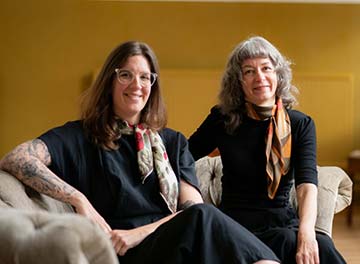
I read about Natural Endings and its championing of newer approaches to funerals and when I mentioned this to friends, heard glowing accounts of the service provided by Rosie and Lisa. I met with them at their new location in central Todmorden and discussed the advantages of their new headquarters, their upbringing and choice of career, some of their favourite things, and how they include families in their approach to providing, 'an authentic farewell'.
Rosie and Lisa answer the HebWeb Q&A
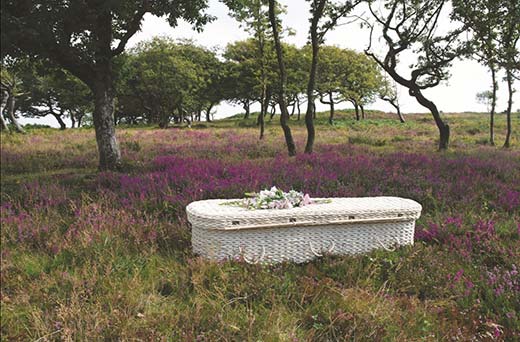
Rosie and Lisa, let's start at the beginning, can you each tell us about your early years, your families and schooling?
Rosie: I'm a Yorkshire/Lancashire girl.
Lisa: I'm Dutch and lived in the Netherlands until I was 23. I grew up in a village in the south, not far from the Belgian border (Dommelen, near Eindhoven, if anyone is particularly interested). I had a passion for acting, reading, stories and history. I grew up in a loving household, with a brother and a sister. I have always been surrounded by strong women, which has definitely shaped me and for which I am really grateful.
Which university courses did you follow? What were your career goals back then?
Rosie: Though I'm dyslexic and struggled with studying I seem to have managed to get a degree in History of Design and a diploma in psychotherapy. My only 'career goal' ever was undertaker. But I was accidentally a modern circus performer for a while.
Lisa: In secondary school I did well in science and mathematics subjects, although I didn't fancy making a career out of those. My parents let us try out different things, find our own way in life. All three of us went to an art academy at some point. I did a year and a half of digital media art before I decided it wasn't for me. I decided to go to University where I did Celtic Studies. I learned Middle Welsh and Old Irish, learned about linguistics and pre-Christian Welsh and Irish tales and folklore.
Rosie, you told me that the death of your mother had a profound effect on you. Did that include a reaction against the traditional style of funeral ceremony?
In 1995 when I was 25 my mum died. I supported her to die at home and it seemed natural to carry on her care. Zoë was an artist and committed Buddhist, she wanted to discuss her funeral before she died.
When the time came I was able to wash and dress my mum myself, friends made her coffin and we held her funeral in a thatched barn. Zoë then had one of the first burials in a newly opened woodland burial ground with a hawthorn tree planted on her grave.
We found that by being fully involved in the entire process and having a very personal funeral in a venue where we could take our time was a cathartic experience. Friends and family used their own skills to make, speak, carry, create and cook.
It was a wonderful day, full of sadness but with great love and pride too. It helped us all immensely. I went on to train to be a funeral director in 1996 with the funeral pioneers Peace Funerals, working in London and Sheffield. I set up Natural Endings in Manchester in 2005 (became limited 2008) and then in Todmorden in 2022.
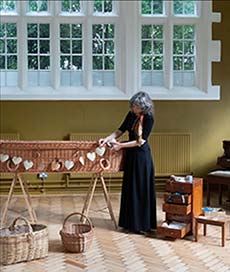
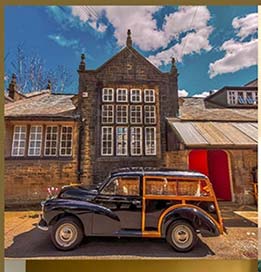
Lisa, what caused you to move to the UK?
A very long story short: I was doing something called Workaway, which is a platform for volunteers and hosts where you live in with people and work in exchange for bed and board. I ended up with some amazing people who I still call my friends and I started to build a life here. I feel very much at home on the British Isles. I love the hills, the history and the British sense of humour.
Can you describe the jobs you've had before Natural Endings?
Rosie: cabaret and modern circus performer
Lisa: I have worked in care, hospitality, as a copywriter, briefly as a scare-actress one October, worked at one of the big funeral companies and ran a funeral support business with my husband before joining Natural Endings in 2022.
Rosie, you wanted to offer female led funerals? Why was that important to you?
Many people would prefer personal care of their loved one to be done by women. I know that I would want my mum, grandma, sister or aunty to have same sex care. It often isn't offered as an option by conventional undertakers. We want to give the choice. We also offer families the chance to be involved in washing and dressing their loved one. We find that people get a lot from being involved in such a tender and actualizing act.
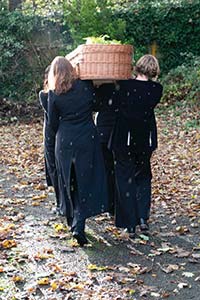 What caused you to move your business from Manchester to Todmorden? Can you explain the advantages of working at your current premises?
What caused you to move your business from Manchester to Todmorden? Can you explain the advantages of working at your current premises?
Because I love Todmorden and we had the opportunity to buy a very special building, the Former Mail Sorting Office in Todmorden. It's a beautiful space and we're able to have the actual funeral ceremony here. That's how Natural Endings ended up in Todmorden.
Working in the valley is very different to Manchester. The space alone gives us the opportunity to re-think conventional ways of doing funerals. We can also have non-funeral events like coffin decorating or vigil style events. They can be at any time, not just weekdays 9am to 5pm. Also, in the valley there are lots of places that will host funeral ceremonies. Wainsgate, Birchcliffe, The Town Hall. We even held one at a hostel once.
We still support families in Manchester, though using facilities there.
We've found some amazing secular venues to host funeral ceremonies.
One of your aims has been to demystify the funeral process. How does your approach differ from traditional practice?
We want to be transparent so we put all our prices on our website in an easy-to-understand format. We also wanted to move away from a 'front of house/back of house' the way conventional undertakers have. We invite anyone to have a look at our mortuary if they wish and ask questions (they don't see the people in our care though). And we do mortuary tours and 'meet the undertaker' events for questions people might have. We invite family and friends to be involved in washing and dressing if they wish. We feel that by doing these things and demystifying we can hopefully make the process less scary and alienating.
Lisa, when we met, you described ways in which close family members can engage in a hands-on care and presentation of their loved one's body?
We offer people to come and dress their person with us, if they wish to do so. Some people know strongly that it isn't for them, which, of course, is absolutely OK. Sometimes, people feel strongly that it is the right thing. When people do help us, it can be incredibly moving. Most people are a bit nervous to start with, but we normalize it and show that it is not a scary thing. You can visibly see people relax and wanting to help. People often start to share stories, memories, whilst we dress their person. There are often a few tears and always some laughter.
Dressing someone is quite a powerful thing, even when Rosie and I do it ourselves, without family members. By dressing a person in their own clothes, their identity comes back.
Spending time with someone's physical form, is a very natural thing to do. It's confirming the reality of what has happened, which can be an important step in the grieving process.
Rosie and I really strongly feel that we want to give people the power back when it comes to funerals and also the care for their person.
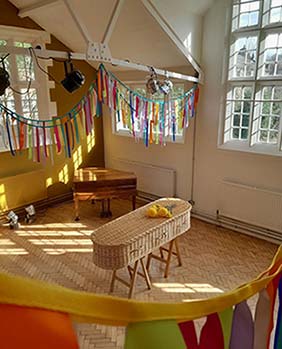
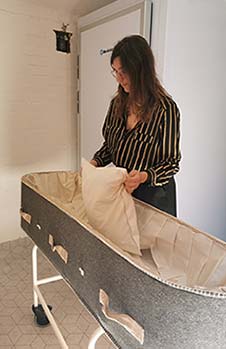
Let's pause … and find out more about you from answering questions suggested by readers.
Favourite nonfiction book?
Rosie: The Outrun by Amy Liptrop
Lisa: I can't think of a favourite but I really enjoyed Raynor Winn – The Salt Path
Favourite novel?
Rosie: I'm a bit embarrassed that I don't really enjoy fiction books
Lisa: Ocean at the End of the Lane by Neil Gaiman
Film?
Rosie: early Wes Anderson films
Lisa: Lord of the Rings
Writer?
Rosie: Dr Robert A Neimeyer (Constructivist psychotherapy and grief)
Lisa: Don't have a favourite.
Artist?
Rosie: I love outside/art brut artwork
Lisa: John Waterhouse and Hieronymus Bosch
Boxset?
Rosie: Couples Therapy
Lisa: Fleabag and Haunting of Hill House. I can watch both over and over.
What makes you laugh?
Rosie: My partner Daniel
Lisa: My husband
Favourite holiday destination?
Rosie: Anywhere with green hills
Lisa: Same, anywhere with beautiful nature, history and food.
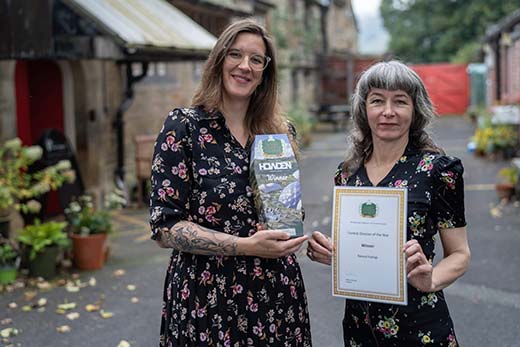
Rosie, you've recently received a Good Funerals award. Can you tell us about the event and what the award means to you?
It's amazing to be recognized for our work with the national award of Funeral Director of the Year. We received it at the Good Funerals awards ceremony at The Eden Project in Cornwall. It was a lovely evening, meeting people we admire from the funeral sector. The main thing that we loved was families writing in to the awards to nominate us and all the lovely things that they said!
Please tell us about the other people in your lives. How do your family, partners and friends react to your work?
Rosie: my partner Daniel is very supportive and proud of me. He loves the way that I bring my psychotherapy practice and my creativity into undertaking. But I think he wishes that I'd get on to non-funeral topics of conversation more!
My mum died a long time ago but I still get a feeling that she would be proud of me. She had sketchbook diaries and I found that she had been considering moving to the valley before she died. She would have fitted in well here. I think my dad thinks it's a bit odd. He hasn't wanted to see the new mortuary. But I think he's happy that I have found a fulfilling and meaningful job.
Lisa: My husband Scott is also very supportive of me. He has experience with the funeral world too. We ran a business together for 2 years. He supports me if I've had a more difficult day. My other family and friends are also proud and supportive that I have found a job that I love so much. Most people are really curious when I tell them I am an undertaker. They have questions about the job, or will share their own experiences. I think it's really healthy for people to talk about death, grief and loss.
People seem to respond in very creative ways to your new style of funerals. Can you give us some examples?
Quite a few people really get into decorating the coffin. Woven coffins are perfect to decorate with flowers. Cardboard coffins are fantastic to write on, paint or stick pre-made images on. We've seen some incredible creations. Our hall in Todmorden has been decorated in some fantastic ways. The beams are great for hanging things off.
People bring in items that belonged to the person that died. They've even brought furniture or the person's bike in or parked a special vehicle outside. Many of the funerals are for artists or musicians so of course their work is shared. Or if they liked making with hands we might do something like that such as little memory boats. They might also bring in and share special food or drink or have a toast. We've had tea ceremonies and eaten favourite cakes. Printed formerly secret special recipe cards.
Occasionally a collection of something might be given away at the funeral. For example, a woman's book collection was given to all her friends with special in memory of Jane 'ex libris' stickers inside the cover.
Some people choose to have an 'open space' during the ceremony. This means there will be about 10-15 minutes where anyone can share some thoughts or a memory of the person. This has led to some really beautiful, spontaneous contributions.
We love all the ideas that our community bring to us to celebrate the members that have died.
Lisa, there must be some quite upsetting occasions in your line of work when you did coroners work?
When Scott and I did work for the coroner (this entailed taking people who died suddenly from the place that they died to a hospital mortuary), we had a lot of support from each other. It's hard to explain how you deal with it. I think some people naturally are able to handle it better than others. You need to know your own emotions well, so you can identify what is part of your feelings and what is part of the other person.
We always made sure we did the best job possible, which helped me to feel at peace. If there was family or friends at the location, we would always make sure we connected with them first. We would introduce ourselves, so they knew our names and faces. We would talk them through the steps we would take, what our equipment looked like and where their person would go. We would give them the opportunity to spend some time with their person, or even be in the room when we place their person on our stretcher. Some people even wanted to help. It was very important to us that they felt they had some control over the situation and that nothing happened without their consent.
Some situations where quite extreme, and I think it depends on each person if they are able to handle them or not.
What is the most gratifying park of your work?
Being able to be creative and to help, in some small way, to make really difficult times for people a little easier. To create environments where hopefully people might connect with the beauty and meaning in amongst the sadness.
Finally, Rosie and Lisa, is there a question you wish I'd asked and how would you have answered it.
Would you like a chocolate ginger biscuit?
Yes please. Can I have three?
Hey George you kindly said you'd be able to add our web link:
naturalendings.co.uk
Thanks so much for interviewing us George! x
More HebWeb interviews from George Murphy
If you would like to send a message about this interview or suggest ideas for further interviews, please email George Murphy

